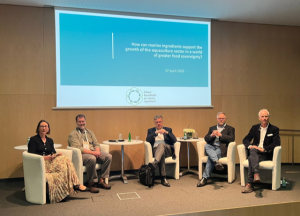IFFO was at Seafood Expo Global in Barcelona from 25 to 27 April 2023, a good opportunity to meet members and stakeholders from the value chain and to progress the work of the Global Roundtable on Marine Ingredients.
 The session run by the Global Roundtable on food security provided an update on the work being conducted in West Africa, India and SE Asia, as well as on the ongoing project led by IFFO with its Members to assess the environmental impacts of marine ingredients. Collaboration across the value chain, involving all the relevant stakeholders on the ground, is instrumental if we want to move forward with a tangible action plan:
The session run by the Global Roundtable on food security provided an update on the work being conducted in West Africa, India and SE Asia, as well as on the ongoing project led by IFFO with its Members to assess the environmental impacts of marine ingredients. Collaboration across the value chain, involving all the relevant stakeholders on the ground, is instrumental if we want to move forward with a tangible action plan:
- in Mauritania and Senegal, where resources are lacking to enforce environmental and social regulations, the FMFO sector could be at the forefront of the improvement and be a catalyst for change according to Arni Mathiesen, independent chair of the Global Roundtable.
- in India, a major global supplier of shrimp, future fishery improvement projects can be a way to support responsible sourcing and production of marine ingredients; alignment with local stakeholders is the way forward, with top-down pressure expected to come from the market. Retailers can play an important role, according to Dan Lee from the Global Seafood Alliance, which leads this work within the Global Roundtable
- in SE Asia, the multispecies characteristics of the fisheries add complexity to the management approach. More tools are needed to understand and manage those complex fisheries (with hundreds of fish species) and the MarinTrust multispecies pilot offers a very good foundation to overcome the accessibility barrier through fishery improvement projects, Dave Martin from Sustainable Fisheries Partnership said. Involvement from regional stakeholders and connection between the Thai and the Vietnamese representatives of the FIPs are key to developing this pilot project, with the support of the local authorities. The Thai Sustainable Fisheries Round Table was the first applicant to the MarinTrust Improver Programme to use the Multispecies assessment methodology.
- the life cycle assessment methodology too relies on all producers of feed ingredients being able to provide comparable data, Dr Brett Glencross from IFFO insisted: the ongoing IFFO project aims to provide a standardised approach based on the PEFCR (product environmental footprint category rules) and the GFLI (Global Feed Lifecycle Assessment Institute) guidelines. Once robust data are available, environmental impacts may be added by the aquafeed sector to the existing list of criteria used in feed formulation. This approach may support a higher uptake of marine ingredients obtained from fish byproducts (31% of global output currently). This is key to the future growth of the aquaculture sector, considering that 80% of the aquaculture’s carbon footprint comes from feed.
As aquafeed producer Biomar puts it in the session on feed alternatives that took place on day 1 of the show: « We don’t buy raw materials. We buy nutrients. We are interested in ingredients that humans can’t or don’t want to eat. We don’t want ingredients that are problem shifting. LCA is an aspect to consider at the early stages of the development of a feed ingredient. »








